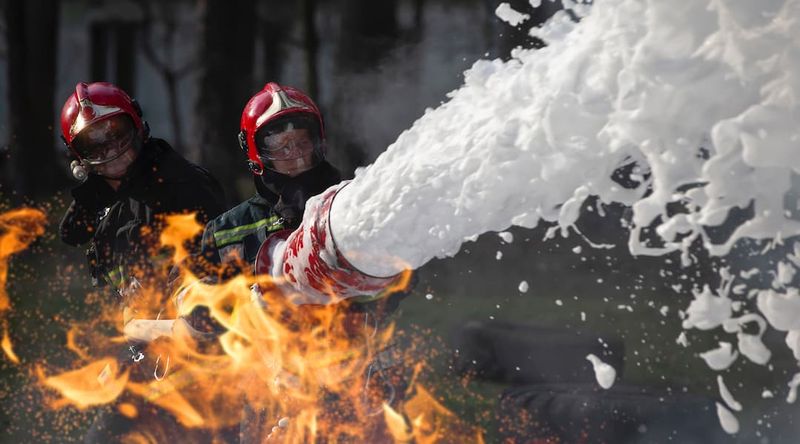
About the Firefighting Foam (AFFF) Lawsuit
AFFF, or aqueous film-forming foam, has been used since the 1960s by firefighters to extinguish fuel fires, particularly at military bases and airports. It contains hazardous PFAS chemicals linked to various cancers. Firefighters exposed to AFFF, especially military and airport firefighters, may be at heightened risk of developing cancers such as bladder, breast, kidney, and more.
If you or a loved one were exposed to AFFF on the job and later diagnosed with cancer, you may be eligible for compensation through a firefighting foam lawsuit to cover medical costs, lost wages, and other damages.
Do I Qualify for an AFFF Lawsuit?
You may be eligible to file an AFFF lawsuit if you:
- Worked as a firefighter
- Were exposed to toxic firefighting foams
- Were diagnosed with cancers such as bladder, breast, colon, kidney, liver, pancreatic, prostate, testicular, thyroid, leukemia, lymphoma, or uterine/endometrial cancer
- Have thyroid disease or ulcerative colitis linked to PFAS exposure
Gather medical and employment records to support your claim, including proof of AFFF exposure and cancer diagnosis.
- U.S. Military Firefighters: The U.S. military used PFAS-containing AFFF for about 60 years, including in training and non-critical missions.
- Airport Firefighters: Until 2018, the FAA mandated AFFF use at airports, increasing exposure risks.
Compensation may cover medical expenses, lost income, and suffering caused by PFAS-related health issues.
Firefighter Foam Lawsuit FAQs
Is AFFF a carcinogen?
Numerous studies show that PFAS in AFFF may cause cancer, particularly in the:
- Bladder
- Blood cells
- Breasts
- Colon
- Kidneys
- Liver
- Lymphatic system
- Ovaries
- Pancreas
- Prostate
- Rectum
- Testicles
- Thyroid
- Uterus
What does AFFF stand for?
AFFF, which stands for aqueous film-forming foam, is a fluorochemical surfactant that includes perfluoroalkyl and polyfluoroalkyl substances (PFAS), hazardous chemicals that have been linked to various types of cancer.
What is AFFF used for?
Firefighters use AFFF, a foam concentrate and surfactant, to put out fuel fires. However, the PFAS chemicals found in AFFF have been linked to various types of cancer, putting firefighters who have been exposed to the foam at risk.
How does firefighting foam work?
Water is not always effective in extinguishing fuel fires as it is heavier than most fuels. When water is used on a fuel fire, it can fall beneath the flames and spread the fire, which can make the situation worse. AFFF or firefighting foam is a specialized foam concentrate and surfactant that is used to combat fuel fires.
AFFF is lighter than water and, when sprayed on a fire, it creates a blanket that separates the fire from the oxygen it needs to continue to burn. This blanket effectively smothers the fire, extinguishing it quickly and efficiently.
Is firefighting foam still used?
Regrettably, despite the known risks associated with toxic PFAS-based firefighting foam, it continues to be used in a variety of airports throughout the country, including for both military and commercial use.
However, the Department of Defense is currently working to research and develop safe, PFAS-free alternatives to AFFF, and the use of AFFF is now limited to emergency responses only.
How do I know if I have an AFFF cancer case?
If you or a loved one has been diagnosed with cancer due to exposure to firefighting foam, contact a national law firm like AFFF lawsuit legal support for a no-cost case assessment to explore your legal options.
Can I afford a firefighting foam attorney?
Definitely. The most qualified AFFF lawyers operate on a contingency basis, which means that you won't be charged any fees upfront. Our attorneys will only receive payment if your case is successful.
How can an AFFF lawyer help me?
Working with a law firm specializing in AFFF cases can alleviate the legal burden and allow you to prioritize your health. An AFFF lawyer can assist you throughout the legal process by:
- Conducting a free case evaluation to determine your legal options
- Gathering evidence to support your case
- Filing your AFFF lawsuit on your behalf
- Negotiating a firefighting foam settlement agreement
- Litigating your case in court if a settlement cannot be reached
How much can I get from a firefighting foam settlement?
It is difficult to estimate the potential value of a firefighting foam lawsuit settlement because the circumstances of each case vary widely. Numerous factors will be considered when determining a firefighting foam cash settlement, such as:
- The severity and type of cancer or other illness caused by exposure to AFFF
- The duration and intensity of the exposure
- The cost of current and future medical treatment
- Any wages lost as a result of the illness
